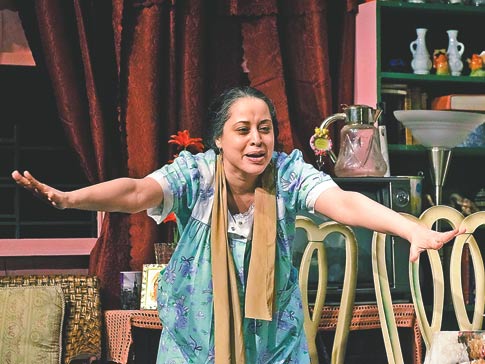Playwright and director Marco Antonio Rodríguez admits he drew from his own experience as the New York-born son of Dominican immigrants when, five years ago, he wrote “La Luz de Un Cigarrillo: Una Historia Dominican-York.”
The Off-Broadway play, which opens tonight at Teatro Latea, 107 Suffolk St., follows the tense relationship between a middle-aged Dominican mother, Lucesita, and her semi-closeted gay twentysomething son, Julio César, who has reluctantly returned home after five years to attend his father’s funeral.
“It’s pretty personal in terms of sharing what I feel is something we don’t normally talk about: sexuality – especially in the Latino culture and in the Caribbean culture. It’s an elephant in the room,” said Rodríguez.
The two spend most of the first act dancing around the proverbial elephant.
At one point, Julio César, played by Ismael Cruz Córdova, leaves the television tuned to a talk show that has gay guests. When Lucesita, portrayed by Susanna Guzmán, begins to mock the “patos” – a derogatory term for gays in Spanish – and their desire to marry, he angrily shouts at her to change the channel if she doesn’t like it.
In many ways, Lucesita and Julio César are strangers; in other respects, they mirror one another. They both share an isolated existence and a resistance to revisit aspects of their pasts.
The elder refuses to leave her tchotchke-filled lower Manhattan apartment – in a rapidly gentrifying building where she is one of the last two Latino holdouts – to visit her hometown in the Cibao region of the Dominican Republic. Her son, meanwhile, has carved out a life with a partner and an acting career in Dallas.
“I don’t look at it as a ‘coming-out play,’ I look at it as two human beings who think they’re different from each other, but they’re not, and what unites them is the love that they have for one another,” said Rodríguez.
The ensemble cast is rounded out by actress Arisleyda Lombert, who plays Divina, Julio Cesar‘s aunt, and Teresa Yenque, as Lydia, Lucesita’s neighbor.
The female-driven story was inspired by Rodriguez’s upbringing as well as a desire to address what he saw as a void in contemporary theater.
“I felt like, ‘Why hasn’t anyone given them the voice?'” he said. “That authentic Spanish Dominican woman who has worked so much here, who has sacrificed – like my mother, my tía – there are so many of them. Why isn’t anyone doing it? Then I stepped in and said, ‘Well I guess, I’ll do it.'”
The drama spiced up with old boleros and merengues, which runs until June 5, is almost entirely in Dominican Spanish and Spanglish (with English subtitles), to be as authentic as possible, says Rodríguez.
“The women that I grew up with, that’s what they were talking – they were not talking in English,” said Rodríguez. “So to me, it was to honor the world that I was sharing with everyone else.”




